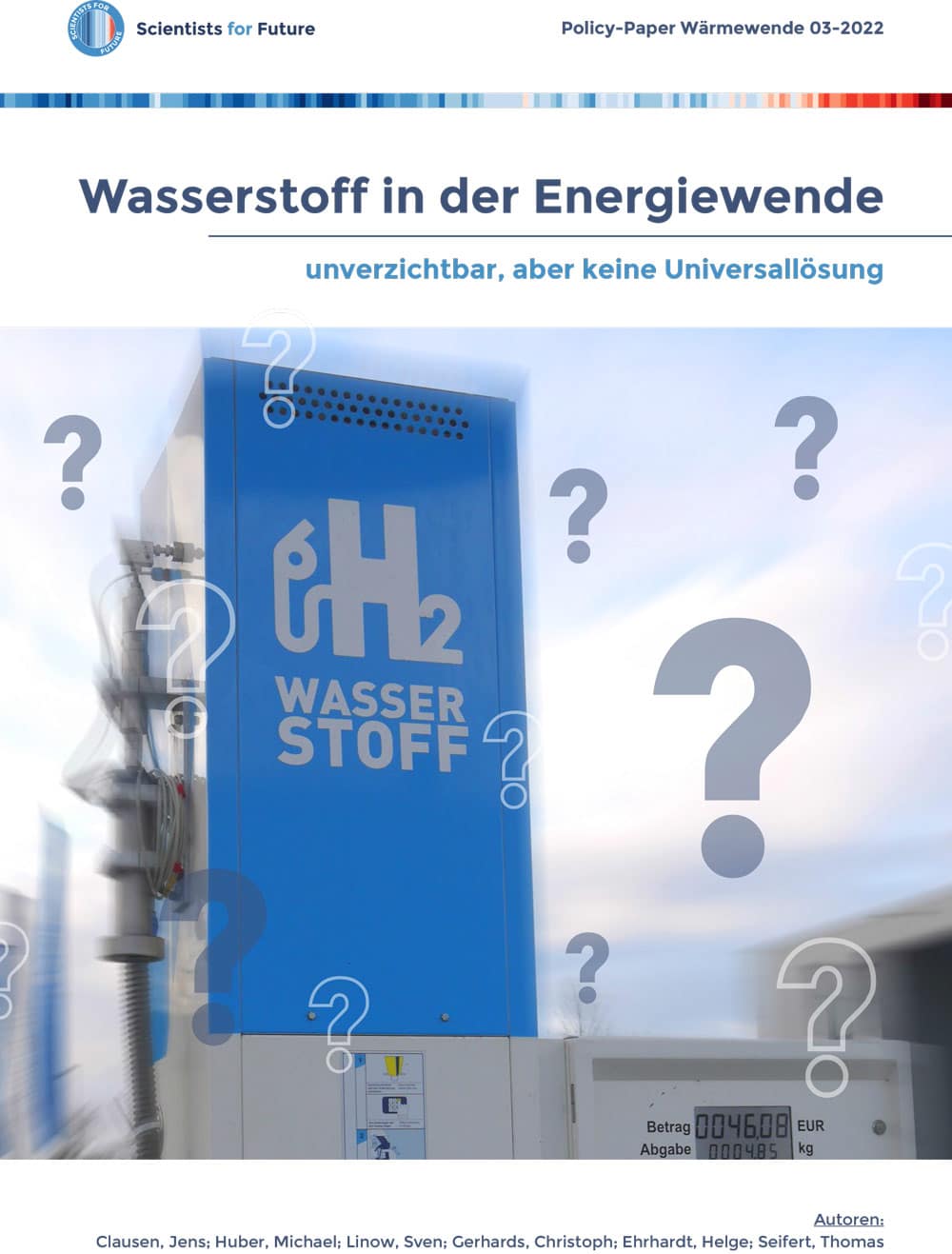The situation for local trains is comparable. Due to the progress in battery technology, the deployment of hydrogen trains would only be advisable as a bridging solution for very long routes without recharging facilities until such time that the lines are electrified or long-range battery-powered trains become available (VDE (ed.) 2019, Soller, 2020).
The position is similar for the production of heat and hot water. Numerous studies by scientific institutions characterize the use of hydrogen for heating as expensive and inefficient compared with electric heat pumps (for an overview see Clausen, 2022).
Shipping is faced with the problem of how to store large quantities of energy for long nonstop journeys. This is where liquefied hydrogen could be the most efficient solution. Synthetic (power-to-liquid) fuels that are manufactured from green hydrogen are generally less efficient as one or more conversion processes are needed for its production. Ammonia, for example, comes into discussion in this context because it is can be stored far more easily than hydrogen. The advantages of liquid fuels in deep-sea shipping are so considerable that other propulsion systems are difficult to imagine. Investigations are also already underway on ammonia-fed fuel cells in ships (Fraunhofer IMM, 2021). However this is less energy efficient in comparison with liquid hydrogen.
One special case is the “dream of carbon-neutral flying” (Bottler, 2021), as promised by the aviation sector with reference to sustainable aviation fuel, or SAF, from hydrogen. At present, SAF, which may also be bio-based, is the most widely known feasible alternative to fossil kerosene for long-haul flights. Yet even the use of SAF has only a minor impact on climate change, equivalent to around 33 percent of the greenhouse gas effect (cf. chapter 4). As such, there is almost no other option than to radically limit air travel, electrify it or endure a lengthy wait for new inventions.
Curbing unrealistic expectations
As it stands, the future deployment of hydrogen is being organized at a much quicker pace than its production. Consequently, the rapid adoption of hydrogen and its intensive use for a variety of purposes risk smoothing a rather direct path toward supply insecurity, a scramble for resources, cannibalism between applications and high prices. One effect would be that damaging fossil fuels would be needed for longer than necessary.
A further risk is that decision-makers and the general public, either through a lack of information or due to wishful thinking, will assume that using hydrogen as an energy carrier will enable the costs of many things to stay the same, for instance in the case of car travel with synthetic gasoline and gas heating with hydrogen in the gas network (which would need to be converted at great expense). This could lead to us introducing a costly and inefficient technology, purely because it seems simple and familiar. We would be committing ourselves to an expensive energy system instead of switching directly to a predominantly electrified system that is better value and more flexible (Zachmann et al., 2022).
Since the production and supply of hydrogen is associated with high energy losses of at least a third of the green electricity used as the primary energy source, we will need much higher volumes of green power to create a “hydrogen world,” i.e., many more wind turbines, photovoltaic plants and others. But already there is a lack of clarity surrounding where all these plants will be located, who will build them and which type of material will be used.
Even if the efficiency of electrolysis can be increased by several percentage points, hydrogen would still be an inefficient and expensive solution in all situations where electric alternatives exist.
Example
In Europe, if we do not electrify industrial process heat, which would use 900 terawatt-hours a year of power (Madeddu et al., 2020), and instead produce and combust hydrogen for heating purposes, then approx. 1,350 terawatt-hours a year of green electricity would be needed for its production. This approach uses approx. 450 terawatt-hours more than the radical electrification route and is roughly equivalent in energy terms to the present-day electricity consumption of Great Britain. Accepting this additional energy consumption solely in order to perpetuate previous practices and behavior makes no sense from an economic or energy standpoint.
Conclusion
Policymakers must not promote hydrogen technologies without proper scrutiny. They should clearly analyze the fields of application and identify the areas where hydrogen represents a good solution and the areas where there are better, more efficient technologies that are less expensive in the long run. By focusing unambiguously on the promotion of electric transportation and heat pumps, the German political establishment shows it is engaged in implementing this key finding.
Reference(s)
J. Clausen et al. (2022): “Wasserstoff ist unverzichtbar, aber keine Universallösung für die Energiewende,” Scientists for Future policy paper. https://info-de.scientists4future.org/wasserstoff-in-der-energiewende/
Authors: Scientists for Future


























0 Comments
Trackbacks/Pingbacks